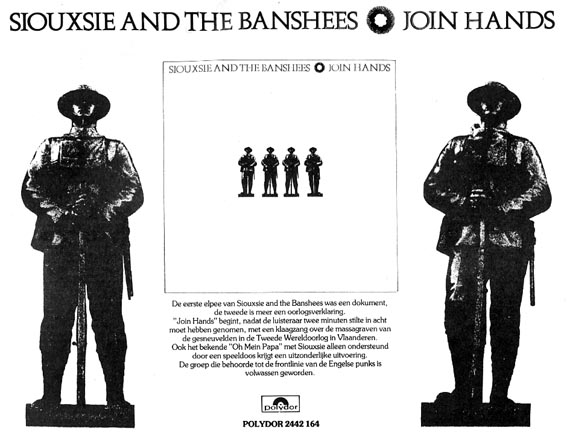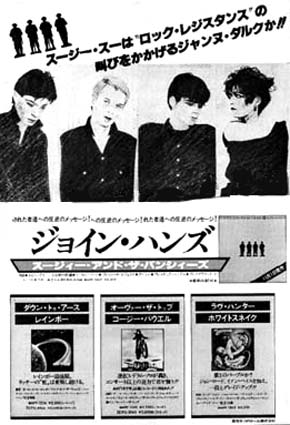 WHADDA
YA mean, is it extreme? Can you honestly imagine the Banshees
doing anything - whether it be throwing shapes for a camera, getting
dressed for a night on the town or making a record - by halves? WHADDA
YA mean, is it extreme? Can you honestly imagine the Banshees
doing anything - whether it be throwing shapes for a camera, getting
dressed for a night on the town or making a record - by halves?
They are, after
all, the self-appointed prophets of the outer limits, superior beings
sent to teach us humbler folk the futility of our ways - at least, that's
the way they seem to often present themselves. For some reason the
stories about John McKay getting very friendly with a bottle of vodka
and passing out in a cinema while trying to watch a film without
subtitles in a language he doesn't speak seem to slip from the memory
when placed alongside headlines that draw attention to the Ice Queen of
New Musick.
Still, that's
the price you pay if you insist on fitting the word 'catalepsy'
into a song as they do on 'Premature
Burial'.
If you talk it, other people are sure as hell gonna make you walk it.
And at the
moment, the Banshees are very much in the unenviable position of
becoming everybody's
favourite whipping boys and girls. After two years hustling in the
wilderness they attained the dizzy heights of a major record deal and
probably surprised a lot of people (including said record company,
possibly) with the self-assured poise of their debut album and the chart
success of 'Hong
Kong Garden'
- I can't
think of anybody outside the band and their manager who thought the
Banshees would become Top Of The Pops regulars with their first
single.
Then came the
relative failure of the follow-up singles, a failure made all the worse
by the unexpected achievement of 'Hong
Kong'
and the band's
rapid blossoming from cult status to second division attraction (ie they're
no ELO but they're
no UK Subs). Obviously I've
no idea of the internal machinations at Polydor, but I suspect that the
record company ceased viewing the Banshees as their new wonderkids
sometime around the week 'Staircase'
failed to leap up the charts from its position tucked into the middle of
the twenties. In this straitened economic climate what else can a
poor record company do but concentrate on the acts which make vast
amounts of money? (In Polydor's
case this probably means Jimmy Pursey and the Bee Gees.)
Added to that
was the change in the press attitude to the band. The Banshees had
simply become boring. There was little left to say once they'd
established their own domain and carved out their own little patch of
the rock 'n'
roll universe (which quite likely includes hating being referred to as
being rock 'n'
roll).
Why think of
the Banshees when you can thrill to the exciting world of Joy Division
or, at the other extreme, the whole new mod movement? Much as they
hate the idea, the Banshees are now established, in much the same
position as, say, Whitesnake. There's
no longer anything particularly exciting or original about them - if you've
heard the first album and the singles, you'll
know, with only maybe one exception, what this album will sound like
even without listening to it. Any band that puts 'catalepsy'
into a song (sorry to repeat myself but I was struck by the
self-conscious intellectualism of it) must have a distinct individual
style, and you hardly expected the Banshees to turn round and start
penning hymns to a brave new youth, calls to action for rude boys now
did you?
Almost
inevitably, the album bears the same relationship to 'The
Scream'
as 'Give 'Em
Enough Rope'
did to 'The
Clash'.
Where the first album represented the collected efforts of a year's
writing, the second had to be written almost to order and what it loses
from not having been kicked around the brain cells for a year, it gains
in thematic cohesion. In the Banshees case, this means tightening
up the fear, loathing, pain, alienation, desperation and all the jolly
things like that and adding - just as The Clash did on 'Give 'Em
Enough Rope'
- a healthy does of military chic. They've
got soldiers on the cover and 'Poppy
Day'
in the first groove.
Ringing in the
new album with a peal of bells, 'Poppy
Day'
sets the tone for the whole forty six minutes - about as cheerful as
Chestrefield. But, like all the Banshees stuff, its doesn't
somehow make you feel like cutting your wrists any more than watching 'Dirty
Harry'
makes you feel like shooting people. Guitars dominate as ever,
prowling around like caged lions, swaying with Siouxsie's
arm swinging. The mix is different to the last album. No
longer does the bass thud around the bottom of the sound, giving you the
impression that it was distorted when it wasn't.
Now there's
a new clarity which frames Sue's
voice like it was a thing of treasure.
A short
fragment of a song it's
still echoing in your head as it snaps into 'Regal
Zone',
the second, more aggressive, more neurotic, more dynamic and even more demonic
offering. If songs were ever min-epics, this would be - it both
frightens and reassures. A few loose slaps around the kit and
Kenny Morris leads the band into 'Placebo
Effect',
a winding tortuous thing in the mood of 'The
Switch'
with added pacing.
'Icon'
has Sue wailing from the depths of a grave - if there isn't
wind whipping around the sound, there should be. 'Premature
Burial' is
even eerier, coming as it does from the background of an Edgar Allan Poe
short story (which was turned into a Roger Corman flick which bore
absolutely no relation to the Poe original). Moody as an Elvis
Presley staring down a photographer, it has Siouxsie's
voice double tracked with devastating effect.
'Playground
Twist' you
know and it's
apparently here because it didn't
sell too well and the band wanted everybody to have a chance to hear it
because they don't
get any airplay and it has bells.
'Mother'
is the exception I mentioned earlier. Sue sings soft and quiet
backed by a music box. Placed as it is between 'Playground
Twist'
and the storming inferno 'The
Lord's
Prayer, its very delicacy displays a touching confusion.
The record
company sheet attached to the album mentioned that it contained the band's
original version of 'The
Lord's
Prayer'.
That's
original as in very weird, not as in normal. It'll
undoubtedly raise a few hackles - Dylan certainly won't
cover a Banshees song on his next album and I doubt if Cliff Richard
will put it in his Star Choice. It's
fourteen minutes of rage and twisted bitterness which includes Sue 'quoting'
from the likes of 'Twist
And Shout'
and the 'Yodeley-ee'
song in 'The
Sound Of Music'.
Both frightening and absorbing, it'll
probably get them in the News Of The World. It deserves
better.
The final
paragraph advises you to buy it if you liked the last album and run as
fast as you can in the opposite direction if you didn't.
It's
probably best you don't
ask yourself why you like the Banshees. I'm
sure in my case its an aberration.
|
 One
thing Siouxsie & The Banshees are not is boring. They can be
good, superb, tedious and terrible all in the space of eight tracks.
One
thing Siouxsie & The Banshees are not is boring. They can be
good, superb, tedious and terrible all in the space of eight tracks.
